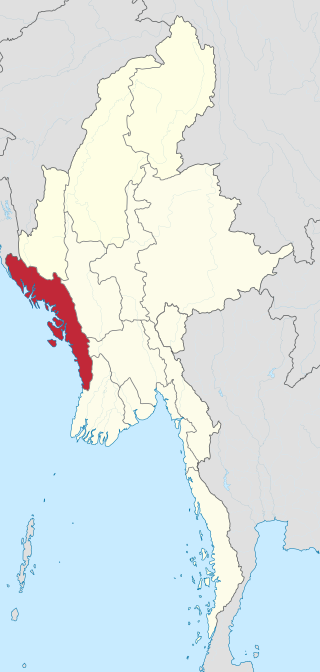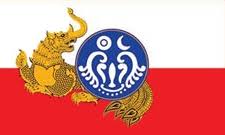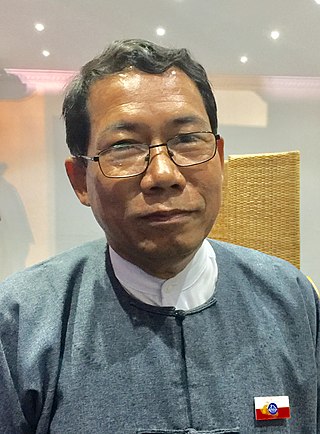
Rakhine State is a state in Myanmar (Burma). Situated on the western coast, it is bordered by Chin State to the north, Magway Region, Bago Region and Ayeyarwady Region to the east, the Bay of Bengal to the west and the Chittagong Division of Bangladesh to the northwest. It is located approximately between latitudes 17°30' north and 21°30' north and longitudes 92°10' east and 94°50' east. The Arakan Mountains or Rakhine Yoma separated Rakhine State from central Burma from North to South. Off the coast of Rakhine State there are some fairly large islands such as Ramree, Cheduba and Myingun. Rakhine State has an area of 36,762 square kilometres (14,194 sq mi) and its capital is Sittwe.

Sittwe is the capital of Rakhine State, Myanmar (Burma). Sittwe, pronounced sait-tway in the Rakhine language, is located on an estuarial island created at the confluence of the Kaladan, Mayu, and Lay Mro rivers emptying into the Bay of Bengal. As of 2006 the city has 181,000 inhabitants. It is the administrative seat of Sittwe Township and Sittwe District.

The Rohingya people are a stateless Indo-Aryan ethnic group who predominantly follow Islam and reside in Rakhine State, Myanmar. Before the Rohingya genocide in 2017, when over 740,000 fled to Bangladesh, an estimated 1.4 million Rohingya lived in Myanmar. Described by journalists and news outlets as one of the most persecuted minorities in the world, the Rohingya are denied citizenship under the 1982 Myanmar nationality law. There are also restrictions on their freedom of movement, access to state education and civil service jobs. The legal conditions faced by the Rohingya in Myanmar have been compared to apartheid by some academics, analysts and political figures, including Nobel laureate Bishop Desmond Tutu, a South African anti-apartheid activist. The most recent mass displacement of Rohingya in 2017 led the International Criminal Court to investigate crimes against humanity, and the International Court of Justice to investigate genocide.
During World War II, Japanese forces invaded Burma, which was then under British colonial rule. The British forces retreated and, in the power vacuum left behind, considerable violence erupted between pro-Japanese Buddhist Rakhine and pro-British Muslim villagers. As part of the 'stay-behind' strategy to impede the Japanese advance, the Commander-in-Chief of forces in Delhi, Wavell, established "V-Force", which armed Rohingya locals in northern Arakan to create a buffer zone from Japanese invasion when they retreated.

The Rakhine, also known as the Arakanese, are a Southeast Asian ethnic group in Myanmar (Burma) forming the majority along the coastal region of present-day Rakhine State, although Rakhine communities also exist throughout the country, particularly in Ayeyarwady and Yangon Regions. They constitute approximately 5.53% or more of Myanmar's total population, but no accurate census figures exist. Smaller Rakhine communities exist in Bangladesh's Chittagong Hill Tracts and in India, where they are known as the Marma and Mog peoples respectively.
Insurgencies have been ongoing in Myanmar since 1948, the year the country, then known as Burma, gained independence from the United Kingdom. The conflict has largely been ethnic-based, with several ethnic armed groups fighting Myanmar's armed forces, the Tatmadaw, for self-determination. Despite numerous ceasefires and the creation of autonomous self-administered zones in 2008, many armed groups continue to call for independence, increased autonomy, or the federalisation of the country. The conflict is the world's longest ongoing civil war, having spanned more than seven decades.

The Rohingya conflict is an ongoing conflict in the northern part of Myanmar's Rakhine State, characterised by sectarian violence between the Rohingya Muslim and Rakhine Buddhist communities, a military crackdown on Rohingya civilians by Myanmar's security forces, and militant attacks by Rohingya insurgents in Buthidaung, Maungdaw, and Rathedaung Townships, which border Bangladesh.

The Arakan Army is an ethnic armed organisation based in Rakhine State (Arakan). Founded on 10 April 2009, the AA is the military wing of the United League of Arakan (ULA). It is currently led by commander in chief Major General Twan Mrat Naing and vice deputy commander Brigadier General Nyo Twan Awng. The Arakan Army states that the objective of its armed revolution is to restore the sovereignty of the Arakan people. In a December 2021 interview, Twan Mrat Naing claimed that the AA had grown to 30,000 troops.

The Arakan National Party, is a political party in Myanmar (Burma), representing the interests of the Rakhine people in Rakhine State and Yangon Region. The party was founded on 13 January 2014 and registered with the Union Election Commission on 6 March 2014. The chairman of the ANP is Thar Htun Hla. The party is known for its hardline ethnic nationalist stance, as well as its Islamophobic and anti-Rohingya positions. Some members of the party were involved in instigating violence against Rohingya people during the communal riots in 2012, which left dozens dead and thousands homeless.

Major General Twan Mrat Naing, also spelled Tun Myat Naing (Arakanese:ထွန်းမြတ်နိုင်), is an Arakanese revolutionary and commander in chief of the Arakan Army, an ethnic armed organization. Twan Mrat Naing has led the Arakan Army since its founding in 2009, and maintains the rank of Major General. Twan Mrat Naing is of Arakanese descent and resides in Laiza, Kachin State, where the Arakan Army's "temporary headquarters" are.

The Arakan Liberation Army is a Rakhine insurgent group in Myanmar (Burma). It is the armed wing of the Arakan Liberation Party (ALP). The ALA signed a ceasefire agreement with the government of Myanmar on 5 April 2012.

Aye Maung is a Burmese politician and was the chairperson of the Arakan National Party, one of Myanmar's ethnic political parties. He is currently the leader of the Arakan Front Party. He is a staunch nationalist known for his hardline stance against the Rohingya people, having tirelessly campaigned against the minority group and have been involved in instigating attacks against them in the communal violence in 2012.

The Arakan Rohingya Salvation Army (ARSA), formerly known as Harakah al-Yaqin, is a Rohingya insurgent group active in northern Rakhine State, Myanmar. According to a December 2016 report by the International Crisis Group, it is led by Ataullah abu Ammar Jununi, a Rohingya man who was born in Karachi, Pakistan, and grew up in Mecca, Saudi Arabia. Other members of its leadership include a committee of Rohingya émigrés in Saudi Arabia.
The following lists events in the year 2017 in Myanmar.
Violent clashes have been ongoing in the northern part of Myanmar's Rakhine State since October 2016. Insurgent attacks by the Arakan Rohingya Salvation Army (ARSA) have led to sectarian violence perpetrated by Myanmar's military and the local Buddhist population against predominantly Muslim Rohingya civilians. The conflict has sparked international outcry and was described as an ethnic cleansing by the United Nations High Commissioner for Human Rights. In August 2017, the situation worsened and hundreds of thousands of refugees fled Myanmar into Bangladesh, with an estimated 500,000 refugees having arrived by 27 September 2017. In January 2019, Arakan Army insurgents raided border police posts in Buthidaung Township, joining the conflict and beginning their military campaign in northern Rakhine State against the Burmese military.

Arakan is a historic coastal region in Southeast Asia. Its borders faced the Bay of Bengal to its west, the Indian subcontinent to its north and Burma proper to its east. The Arakan Mountains isolated the region and made it accessible only by the Indian subcontinent and the sea. The region now forms the Rakhine State in Myanmar.

On 25 August 2017, Hindu villages in a cluster known as Kha Maung Seik in the northern Maungdaw District of Rakhine State in Myanmar were attacked and 99 Bengali Hindu villagers were massacred by Muslim insurgents from the Arakan Rohingya Salvation Army (ARSA). A month later, the Myanmar Army discovered mass graves containing the corpses of 45 Hindus, most of whom were women and children.
The Communist Party of Arakan (CPA), also known as the Arakanese Communist Party (ACP), was a communist party and armed insurgent group active in Arakan, Burma. It was founded in 1962 after a faction under the leadership of Arakanese political leaders Kyaw Zan Rhee and Bo Maung Han broke away from the Red Flag Communist Party (RFCP).

The United League of Arakan is an Arakanese political organisation based in Laiza, Kachin State, Myanmar. Its armed wing is the Arakan Army. Major General Twan Mrat Naing is the ULA's chairman and Brigadier General Nyo Twan Awng is in the secretary. The United League of Arakan is the member of the Federal Political Negotiation and Consultative Committee (FPNCC), the political negotiation team formed by seven ethnic armed groups in Myanmar.

The Arakan Front Party is a political party in Myanmar seeking Arakanese self-determination. It was founded on 11 October 2018 by Dr. Aye Maung, former chairman of the Arakan National Party, and his colleagues, including his son Tin Maung Win.















